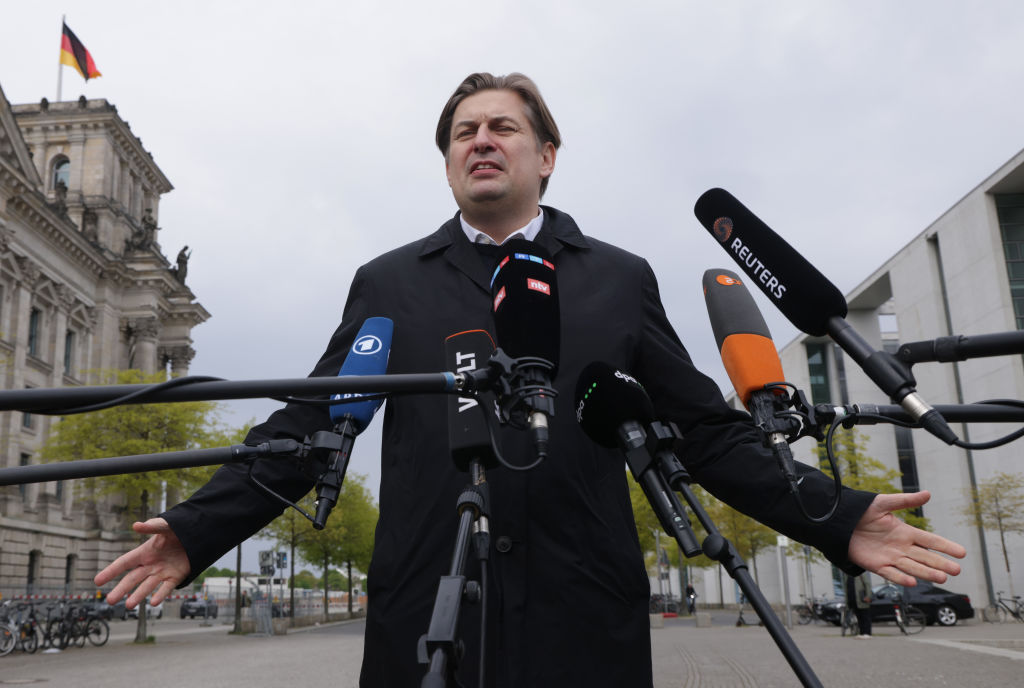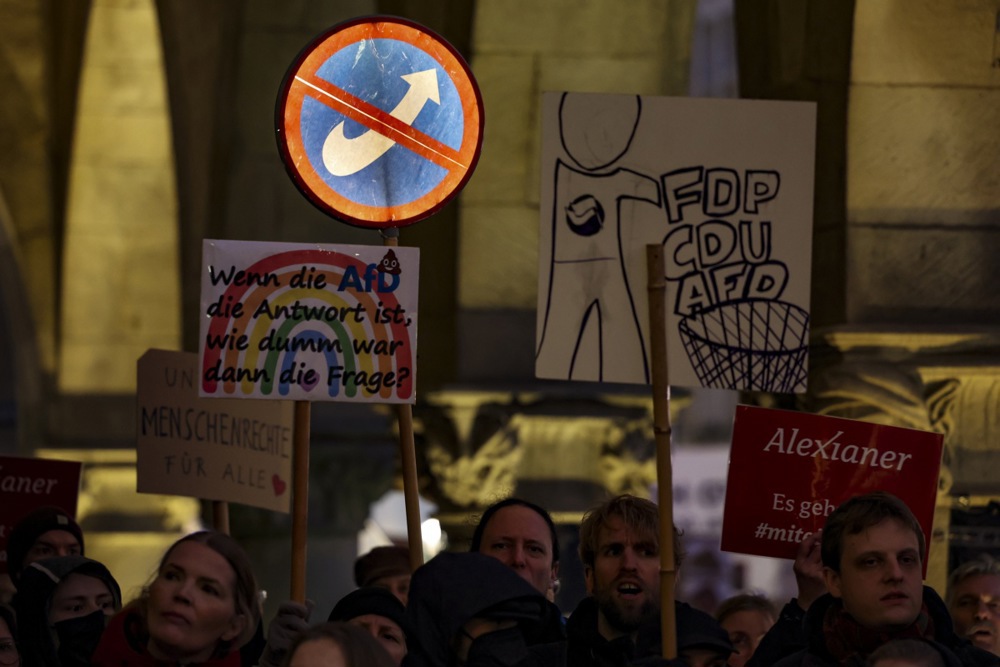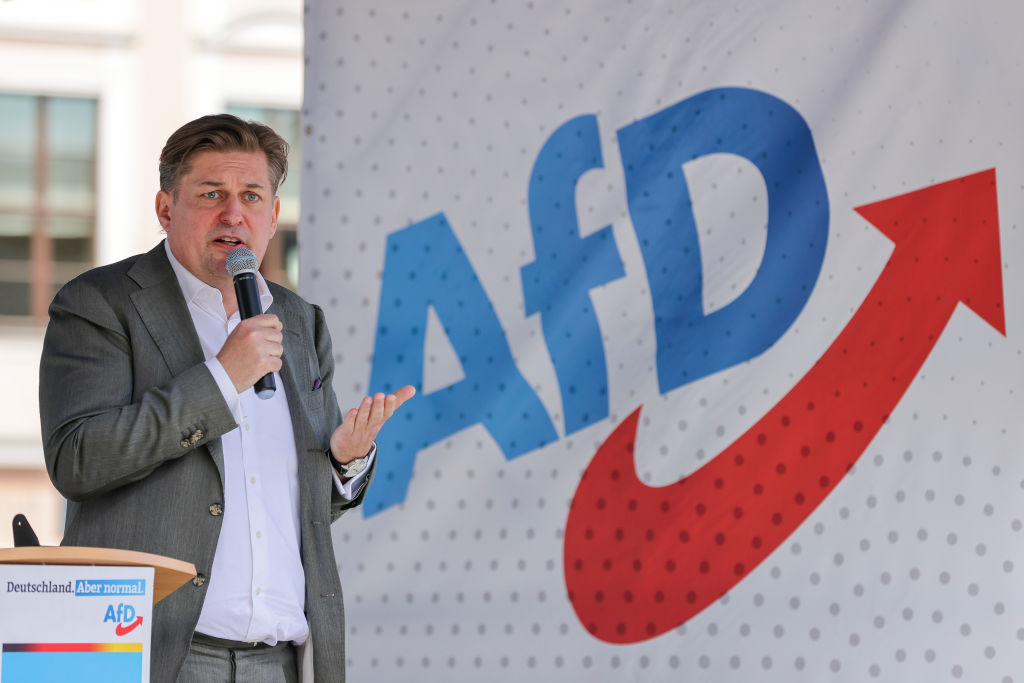The Identity and Democracy group in the European Parliament is in choppy waters after France’s right-wing populist Rassemblement National (RN) said it no longer wanted to serve in an EU parliamentary group with Germany’s Alternative für Deutschland (AfD).
The split came following an interview AfD list leader Maximilian Krah, during which he said that not all members of the Nazi SS paramilitary organisation had been “criminals”, causing widespread outrage.
“I wouldn’t say that anyone wearing an SS uniform is automatically a criminal,” Krah told La Repubblica on May 18. “Guilt must be assessed on a case-by-case basis, at the end of the war, there were nearly a million SS men.
“Even [late German author] Günter Grass was a member of the Waffen-SS,” Krah noted, adding that “among the 900,000 SS there were also many peasants: there was certainly a high percentage of criminals, but not only”.
Man kann nie tiefer fallen als in Gottes Hand. Ich nehme zur Kenntnis, dass sachliche und differenzierte Aussagen von mir als Vorwand missbraucht werden, um unserer Partei zu schaden. Das Letzte, was wir derzeit brauchen, ist eine Debatte um mich. Die AfD muss ihre Einigkeit…
— Dr. Maximilian Krah MdEP (@KrahMax) May 22, 2024
RN campaign manager Alexandre Loubet told the AFP news agency on the evening of May 21 that Jordan Bardella, RN leader and its lead candidate for the EP elections, no longer wanted to share a group with the Germans due to the scandal.
“We will no longer sit with them during the next term,” the campaign manager confirmed to left-wing newspaper Libération.
Another RN insider meanwhile described the comments as an attempt to flatter the nationalist side of his own electorate in Germany. They were, however, offensive to his allies in Europe, causing collateral damage to other members of the ID group.
Responding to the crisis on May 22, Krah announced he would refrain from making any further European Election campaign appearances with immediate effect, and resign as a member of the AfD’s federal executive board.
As of writing, he will continue to serve as AfD’s lead candidate.
Maximilian Krah MEP, the German Alternative für Deutschland party’s list leader in June’s elections, will take a back seat in the campaign amid a controversial case of alleged espionage, following a crisis meeting with AfD bigwigs. https://t.co/hpHEPB5aSw
— Brussels Signal (@brusselssignal) April 25, 2024
Ever since the scandal surrounding a “conspiratorial” AfD gathering in Potsdam regarding immigration broke earlier this year, relationships between RN and AfD had become highly strained.
AfD leader Alice Weidel travelled to Paris in February in a bid to restore ties. That seemed to have little effect as RN demanded a written commitment that “remigration” would never be part of the AfD programme, French media reported.
RN has been working hard to appear a more middle-of-the-road party well capable of governing and statements by the more extreme AfD did not sit well in Paris.
Another faux pas irked the French in April, when the AfD called on the German Federal Government “to take a position on the resolutions of the United Nations General Assembly, according to which France must return the Mayotte archipelago to the Union of the Comoros”.
Marine Le Pen, who was on a visit in Mayotte at the time, where her party remains very popular, said she was “angry” with the AfD and stated the party “would [do] better [to] deal with Germany’s problems”.
“I will explain to them the reason why the people of Mayotte have already expressed their wish to be French three times,” she added.
An AfD spokesman said that the comment was aimed at the “ambivalence” of the German Government on self-determination referendums, in particular one held in Crimea in 2014.
Brussels Signal reached out to several members of the ID group but as of writing, had not received a response.
It is unclear whether the AfD could be expelled from the group but if that were the case, it could open the door for other parties. In particular, Viktor Orbán’s Fidesz Party in Hungary and André Ventura’s Chega Party in Portugal may now be tempted to join.
In an exclusive interview with Brussels Signal, @KrahMax, German AfD party list leader for the EU elections in June, wants the Czech intelligence service to provide proof regarding accusations that colleague, Petr Bystron MP, has taken Russian bribe money. https://t.co/93WPEihVrw
— Brussels Signal (@brusselssignal) April 4, 2024





